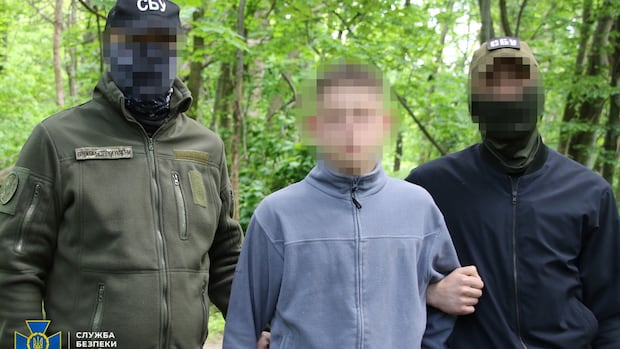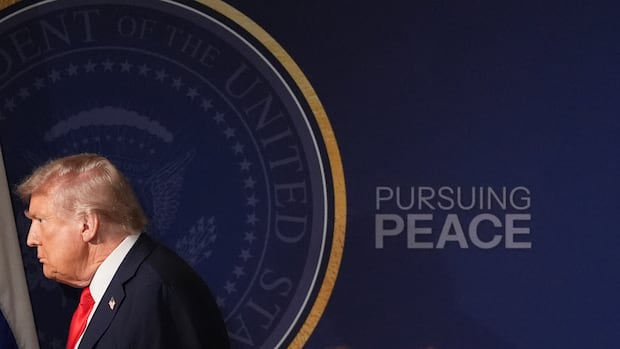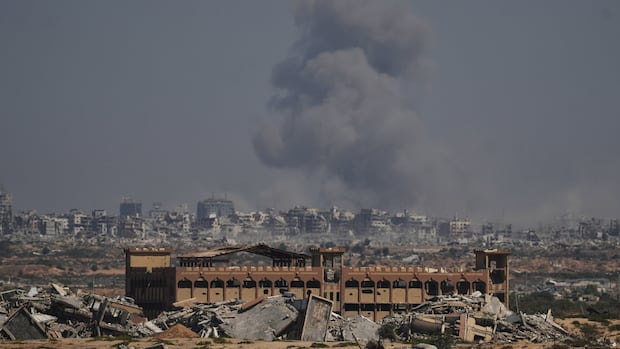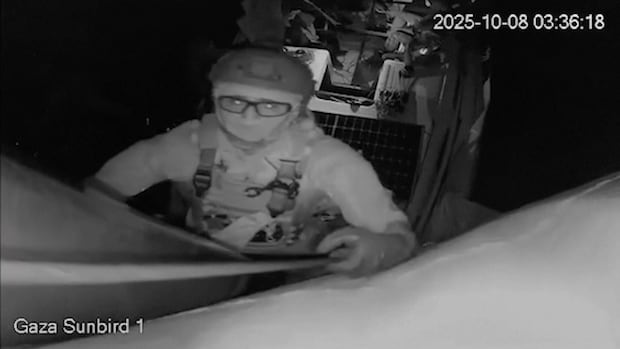At first glance, it appears like a blob of beige dough stuffed with metal nuts, bolts and nails — a Frankenstein fruitcake.
But if you look a little closer at the police photo, this is a classic improvised explosive device, one that Ukrainian authorities say was meant to be planted at an army centre in Kyiv.
Canadian Forces faced a similar type of IED on roadsides or in the path of armoured convoys during the war in Afghanistan. Except this was found in the capital of Ukraine, and instead of the Taliban, this bomb involved a local teenager.
According to the Security Service of Ukraine (SBU), it was one of many cases involving a civilian recruited online, who Russian agents “tasked to secretly plant the bomb under the walls of a military facility” to “remotely detonate it.” (The teen was arrested in May.)
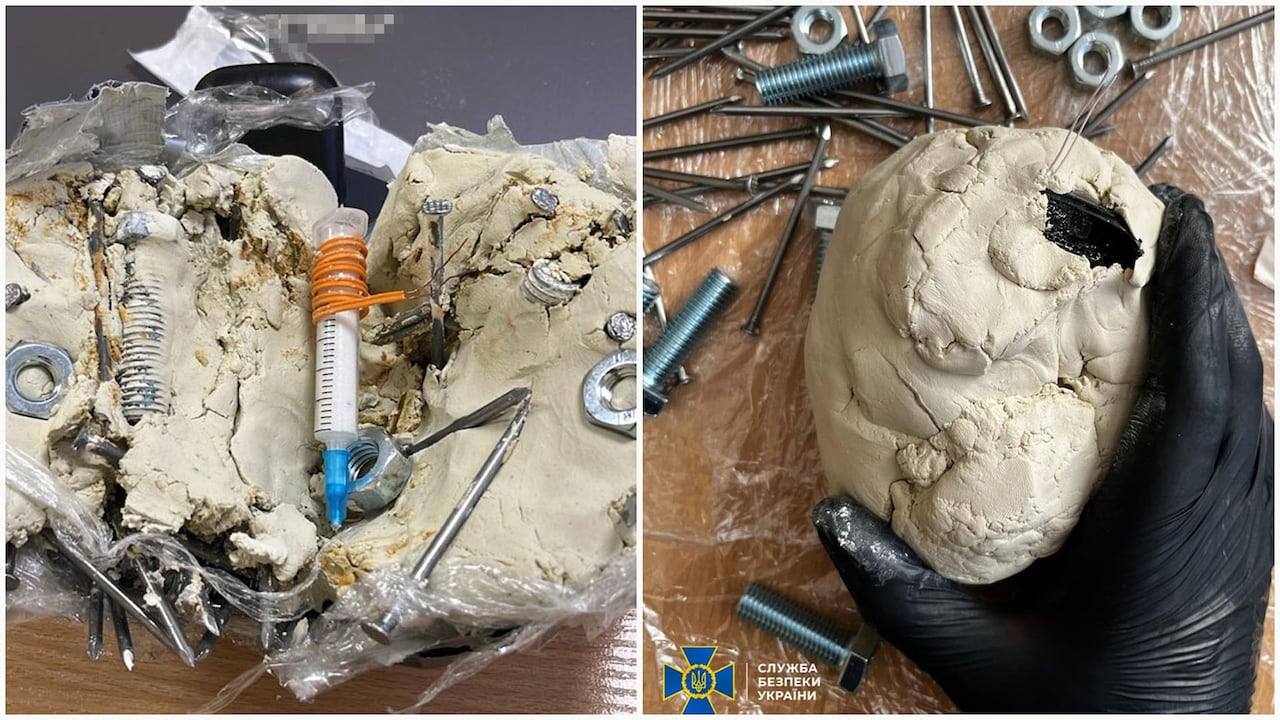 These are Ukrainian police photos of a Russian improvised explosive device (IED) that was meant to be used at a military recruitment centre in Kyiv. (SBU)
These are Ukrainian police photos of a Russian improvised explosive device (IED) that was meant to be used at a military recruitment centre in Kyiv. (SBU)“Russia is basically exploiting vulnerable individuals who are desperate for some sort of money to carry out these attacks,” Steven Rai, a digital research analyst at the U.S.-based Institute for Strategic Dialogue who tracks global terrorism, told CBC News. “They don't care if they're teenagers, they don't care if they are homeless people, they really don't care what the background is — they just want people to do this sort of activity.”
As the frontlines of the war in Ukraine continue to be described as a “meat grinder,” the shadow wars between the Kremlin and Kyiv have intensified and become increasingly ugly, with incidents like IEDs in Kyiv becoming more common.
Covert assassinations, railway sabotage, car bombs, even the involvement of a designated terrorist group with a history in Canada — they're all making the biggest land war in Europe since the Second World War look like the olden times of the global war on terror.
In June, Ukrainian special forces stunned the world when they secretly ferried kamikaze drones deep inside Russia and as far as Siberia to destroy parts of a sitting Russian strategic bomber fleet, in what is now known as Operation Spider’s Web. Mysterious agents in the employ of Kyiv have also put Russian officers living in the safety of Moscow on edge.
But inside Ukraine, Russia has been playing its own spy games. It has sought to weaponize Ukrainian civilians as operatives and informants against their own nation. Using encrypted apps like Telegram, agents of Russia’s FSB — its main spy agency — extort or offer financial rewards to Ukrainians for acts of true insurgency.
WATCH | Steven Rai on why Russia is recruiting saboteurs:Steven Rai, a digital research analyst at the U.S.-based Institute for Strategic Dialogue who tracks global terrorism, said 'Russia is basically exploiting vulnerable individuals.'Recruits are typically directed via the Telegram app to a cache where they pick up bombs or guns and are given a mission. For example, in a failed plot over the summer, the FSB duped a Ukrainian man into an attempted assassination of a military officer in Kyiv, providing the target's home address and the location of a Kalashnikov assault rifle.
Raising awarenessThe problem has become so common, specifically among Ukrainian teens, that the SBU created an educational ad campaign, dubbed “Burn the FSB Man,” and sends officers into schools to lecture students on how not to be recruited.
Official ads featuring dramatizations of treason and illustrations of a hooded man are plastered on billboards throughout Ukraine and played on YouTube.
WATCH | Ukrainian educational video about Russian sabotage methods:
“The video informs citizens, especially young people,” said the SBU in a post on their website. “Russian special services are actively hunting for minors on the internet, offering them criminal jobs.” So far, the SBU has foiled multiple IED attacks across the country, as well as arson, assassinations and other acts of violence emanating from Kremlin spies.
But not all of Russia’s plots can be stopped, and SBU agents are also targets.
In July, as a top-ranking SBU colonel, Ivan Voronych, walked through a parking lot in broad daylight in suburban Kyiv, a masked gunman killed him with a silencer pistol and escaped into a waiting vehicle. The SBU quickly tracked down the two assailants and, in its words, “liquidated” them. But not before the American-born and internationally designated neo-Nazi terrorist group The Base claimed involvement.
In early 2025, The Base had announced its new Ukrainian cell on a Telegram page, causing alarm among counterterrorism experts who knew that its leader, Rinaldo Nazzaro, was an accused Russian spy. Then the cell started offering cryptocurrency for acts of sabotage and assassinations against the “Kyiv regime.”
After the killing of Voronych, “they came right out and said, ‘This was our activists who knocked off the senior operative,’” said Rai. He explained that the official story from the Ukrainian government pinned the killing on two Azerbaijani nationals who had ties to Russian organized crime.
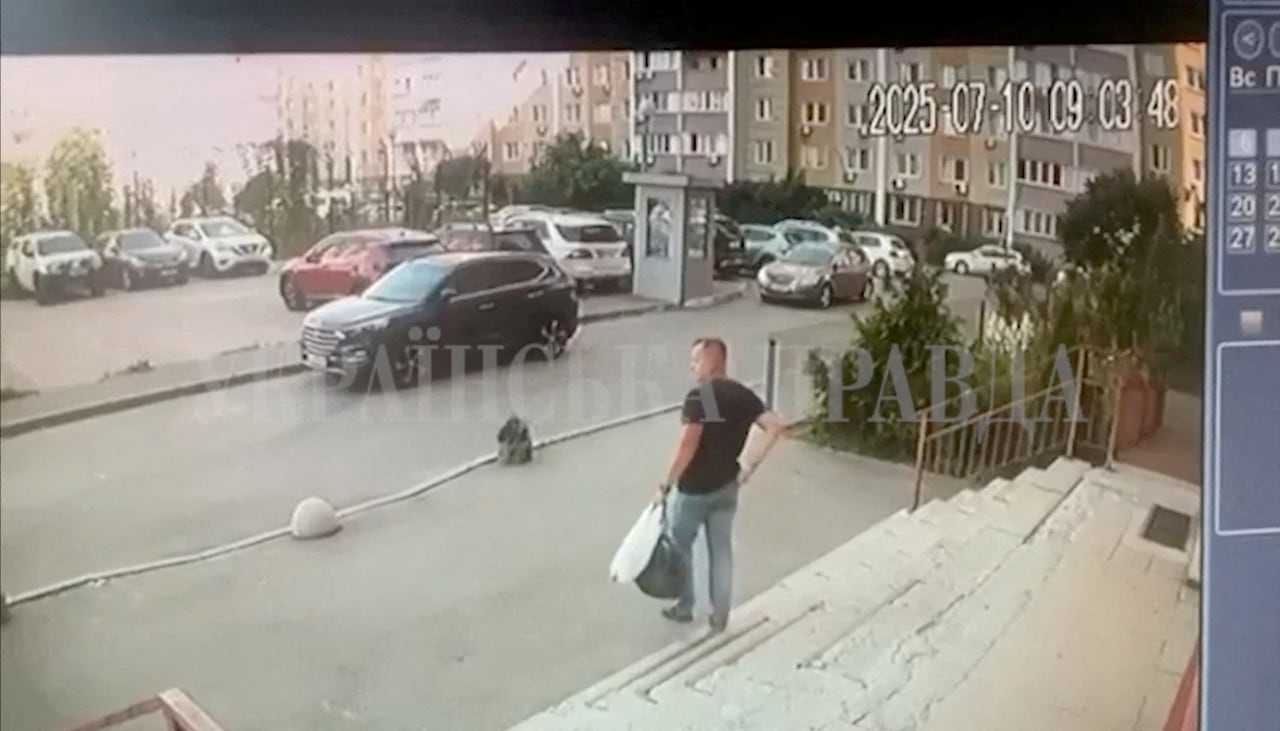 CCTV footage shows a Security Service of Ukraine (SBU) officer walking down the stairs moments before he was shot in Kyiv, Ukraine, on July 10, 2025. (Ukrainska Pravda/Reuters)
CCTV footage shows a Security Service of Ukraine (SBU) officer walking down the stairs moments before he was shot in Kyiv, Ukraine, on July 10, 2025. (Ukrainska Pravda/Reuters)To Rai, however, that “fuzzy picture” didn’t preclude The Base, which very well could’ve been the vector for the killers to act on Russia’s behalf.
There’s also reason to believe The Base in Ukraine is serious. Its videos on Telegram show what appears to be burning Ukrainian police and military vehicles, arson at a government building and electrical boxes set alight. In the U.S., after a years-long FBI probe, several Base members were arrested on terrorism-related charges, including Canadian cell leader Patrik Matthews, who is currently serving a nine-year prison sentence.
Rai pointed out that it matches a pattern of Russian espionage carried out across Europe.
“We've seen this dozens of times, where individuals across Europe who may or may not know of the Russian government's role in all of this are taking these cryptocurrency payments just to make a quick buck in carrying out these acts of arson and other types of criminality,” said Rai.
Russian hybrid warfare on the European continent includes the hiring of local criminals or sponsoring other operatives unconnected to the Russian government to carry out sabotage of cargo planes, critical infrastructure and energy facilities — providing the Kremlin with a thin veneer of deniability.
Ukrainian actionsFor its part, Ukraine has responded in kind, using some of its own civilian and paramilitary saboteurs currently under the yoke of Russian forces. They now control parts of the eastern Donbas region, Kharkiv, Kherson, the entire Crimean Peninsula and a sliver of Dnipropetrovsk.
“We are trying to stop their activities in every possible way,” said an officer in the Ukrainian Special Forces who commands the Rukh Oporu, a state-sponsored resistance movement made up of partisan paramilitaries, citizen spies and informants in Ukrainian territories under occupation. “We are trying to disrupt all convoys delivering ammunition, food, fuel.”
The officer, who was given the cover of anonymity because of the prize Russia has placed on his head, told CBC News his operatives range from spies who inform on Russian military movements to agents blowing up trains and communications lines and assassinating Russian soldiers of every rank.
“They are afraid of us,” said the officer. “Because we often eliminate not only regular military personnel … but also middle-ranking officers, as well as high-ranking officers.”
The FSB is hunting the Rukh Oporu and other resistance fighters. But the officer said his operatives hunt back: “We will also eliminate those representatives of the special services of the Russian Federation who torture our citizens of Ukraine.”
WATCH | Ben Makuch's full documentary for The National:A hidden battle is intensifying beyond Ukraine’s front lines. For The National, CBC’s Ben Makuch breaks down how ordinary civilians are being drawn into a dangerous shadow war — and the dark new dimension it brings to the conflict.Some of these highly classified activities extend outside of Ukraine and into mainland Russia. For example, Atesh, a Ukrainian partisan group with strong links to ethnic Tatars of Crimea, co-ordinates with Ukrainian special forces and security services, has become particularly adept at destroying logistics railways. (Russia has declared Atesh a terrorist entity.)
Inside the Moscow region, where Russian President Vladimir Putin spends most of his time, Ukrainian security services have allegedly used car bombs to kill Russian officers and political figures, including a general.
There’s clearly no love lost between Russian and Ukrainian forces, but the Ukrainian officer hopes this war — which is aging into yet more brutality — can come to a just end in the near future.
“We are fighting not only today for our state, we are also fighting for the whole of Europe and also for the opportunity to live in a free world and where peace reigns,” he said.
“Where people use the rules and live without encroaching on other people's lives or on other people's lands.”





